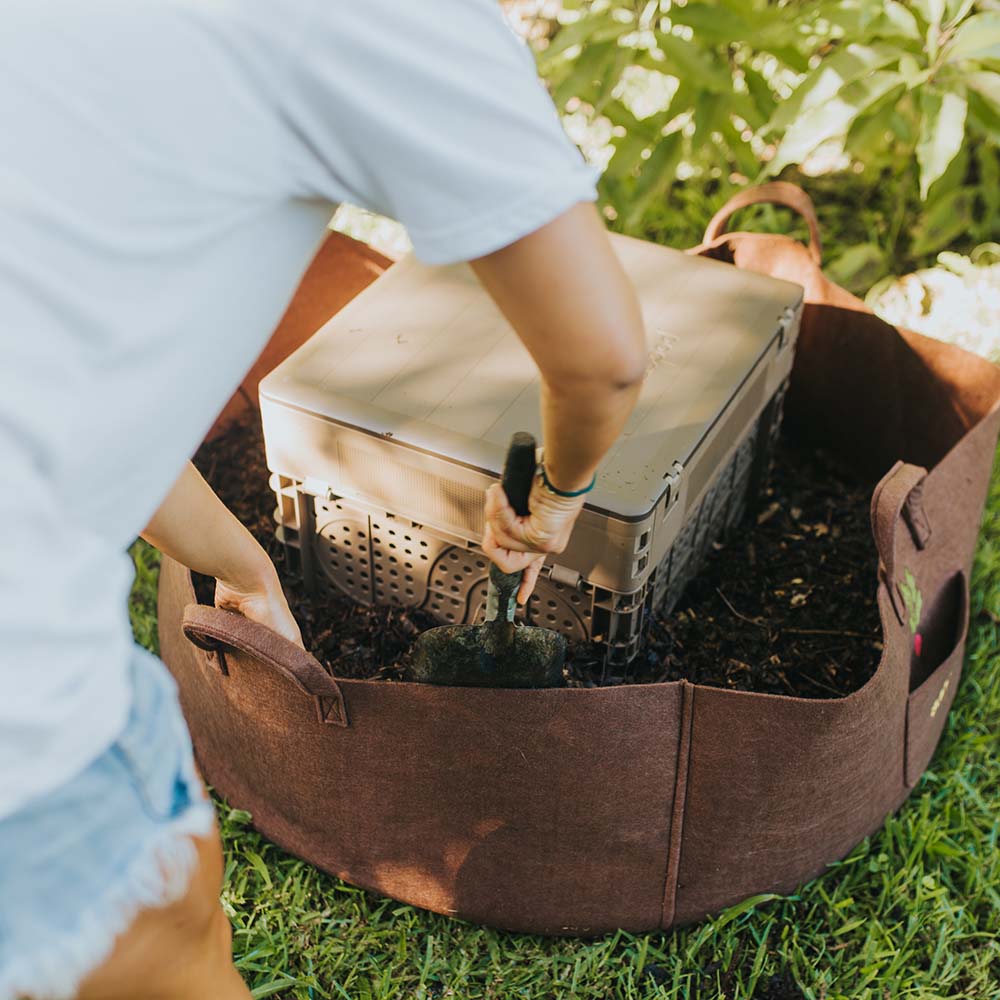Citrus in Compost
In this article:
Composting is one of the greatest gifts you can give to the planet. It keeps your food waste out of landfill, it feeds the soil, and it helps grow healthy plants right in your garden. While technically all matter that was once alive decomposes and should be able to be composted, there are question marks over whether some should be added to your compost bin.
Citrus, which includes oranges, lemons, limes, and grapefruit, is one of those question marks. We get asked all the time whether citrus can be composted! Can citrus peels go in the compost bin? What about the fruits themselves? What precautions have to be taken? Will it be beneficial for my compost?
We’re going to answer all that and more for you, right now!

Can You Put Citrus in Compost?
Opinion on this is divided because citrus isn’t the most straightforward of fruits to compost, but the right answer is that yes, you can definitely compost citrus. A lot of the concern around composting citrus is that it is quite acidic, so can affect the natural balance in your compost bin. There are ways to work around this though, and it shouldn’t prevent you from enjoying the other benefits that citrus will bring to your compost.
Among these is the fact that citrus is rich in nitrogen, potassium, and phosphorus, making it a solid source of nutrients for your compost. It also has a strong scent that pests and scavengers don’t like, so it acts as a natural deterrent to them. We’ll discuss these and other benefits further down, as well as teach you the correct methods for composting citrus.
First, there’s another question that needs to be asked…
Are Citrus Fruits Considered 'Green' or 'Brown'?
If you’re new to composting, you might be wondering about the terms ‘green’ and ‘brown’ that seemed to get referred to a lot. They actually help you categorize your organic materials that go into the compost bin:
Greens: These are materials that are rich in nitrogen. Including most of the food waste in your kitchen as well as things like fresh grass clippings and coffee grounds, they have a high moisture content and don’t necessarily have to be green in color.
Browns: These are much drier, and have a high carbon content. Sawdust, dead leaves, shredded paper and cardboard, and even dried twigs are all examples of browns. Fun fact - browns do actually tend to be brown!
To answer the question, citrus is considered a green material, as it has a high nitrogen content! Your compost bin needs an optimized ratio of greens and browns to be effective. A ratio of one part green to two or three parts brown is a good rule of thumb, although this can be adjusted according to the conditions within your bin.

The Benefits of Composting Citrus
Composting is an important method of contributing to the sustainability of the planet. Being able to toss your citrus food waste into the compost bin is integral to that, but there are also other benefits to composting citrus:
Citrus Deters Pests and Scavengers
The oil in citrus peels is a natural deterrent to pests and scavengers. They don’t like the scent, so will likely avoid your compost bin altogether. These citrus oils also don’t harm the useful microorganisms responsible for the breakdown of your food waste. They also pose no threat to friendly insects stopping by your garden!
Citrus Warms Up Your Compost
If you use a hot composting method, a benefit from adding citrus is they warm the whole pile up by exuding heat as they decompose. This speeds up the entire decomposition process and improves the efficiency of your bin or pile.
Citrus is Rich in Nutrients
As we’ve established, Citrus is considered ‘green,’ meaning it has a high nitrogen content. It also contains a whole host of other nutrients, including the other two staples of phosphorus and potassium. When you add it to your compost, those nutrients directly benefit the decomposing agents and the plants the compost fertilizes.
Improve Soil Structure
Citrus peels in particular can help improve the structure of your compost and the soil it's applied to. This improves its water retention capabilities and aeration too, allowing for oxygen to reach helpful microorganisms.
The Types of Citrus Fruits That Can Be Composted
Depending on the tastes of your household, you’ve probably got a range of citrus fruits at any given time. The good news is, these can all be composted, from their peels to their flesh and rinds. Let’s take a closer look at some of them:
Oranges
Oranges are probably one of the most widely consumed citrus fruits and one of the best ones to compost. You can compost the entire fruit, including the peels, which will introduce good amounts of nitrogen, phosphorus, and potassium into your compost. We’d recommend you remove the seeds before composting, as these may end up sprouting in your bin!
Lemons
A tangy favorite, lemons are another ever-present citrus in homes around the world. As with the other citrus fruits, they have a high acid content, which you need to bear in mind when composting. They’re a good source of important nutrients for your compost, and the peels and fruit can all be composted.
Grapefruits
As with oranges and lemons, it’s safe to compost grapefruit if you follow the necessary precautions. We’re going to discuss these steps in detail in the next section. Remember that the peels of citrus fruits contain a chemical substance called d-limonene which not all bacteria will work on. These can lead to the peels taking a long time to decompose. We’ll teach you how to work around that below!
Limes
Limes are another common citrus fruit, found in everything from cocktails to savory dishes! They’re a nutrient-rich addition to a compost bin, so please don’t send them to landfill!
Now we’re going to explain the best practice for how to compost citrus.
How to Compost Citrus
Don’t let the controversy around composting citrus fruits put you off by adding them to your compost bin. It can be done, and is also very beneficial… you just need to follow these measures:
Separate the Peel from the Flesh
Citrus peels are harder, and as discussed above they contain d-limonene which some bacteria don’t like. Separating the peels from the flesh gives the microbes and bacteria in your bin easier access to the citrus fruit itself, which they can get to work on decomposing.
Remove Seeds
The conditions inside your compost bin can be a nice fertile spot for seeds to germinate! Before you know it, you could have a citrus orchard growing out of your compost bin! If you want to avoid the seeds sprouting, remove them before adding any fruit into the compost bin. If you forget to do this, you could always transplant the sprouts to somewhere suitable in your garden!
Chop the Citrus into Smaller Pieces
Remove the peel from the citrus fruit, and split up the segments of the fruit before you pop it into your compost. You can even go one step further and chop it all up into smaller pieces. This creates more surface area for the microbes and bacteria to work on, speeding up the decomposition process. Drying out the citrus peels before adding them is another step that helps make the process more efficient.
Keep Your Compost Balanced
A well-balanced compost bin is the key to ongoing success! Mix enough browns in with your citrus waste and other greens, to ensure optimized moisture content and structure. You can adjust the balance as you go - if it's too moist, add more browns. Too dry, add more greens. Don’t add too much citrus at any one time, rather stick to smaller amounts to prevent overloading of the compost-creating organisms!
How to Compost Citrus with Subpod
Subpod is a vermicomposting system, meaning it relies on worms and microbes to break down your organic matter into nutrient-rich compost. You’ll hear people say that you should avoid putting citrus into your worm farm at all costs because worms don’t like the acid levels of compost. It’s true, they don’t - but you can definitely still compost citrus in your Subpod, particularly if you follow the steps above on ‘How to Compost Citrus’.
The reason Subpod is a worm farm composting solution that can take on board oranges, lemons, and other citrus lies in its design. There are strategic ‘worm flow’ holes placed around the sides of the Subpod, allowing worms to freely move between the food waste inside and the surrounding soil. If you place something the worms don’t tolerate into the Subpod, they will move away into the surrounding soils and leave it to the bacteria and microbes to take care of.
Subpod is sturdy and robust, keeping pests out and smells in. The composting process is aerobic, which is almost odorless when compared to anaerobic composting solutions. This means no upset neighbors! What’s more, Subpod looks great - a stylish addition to any garden that even doubles up as a garden seat.
If you want to get home composting, even if you live in an apartment or have a tiny outdoor space, Subpod is here to help. Our worm farms, with their range of accessories, can be used in any size of space, from balconies to small courtyards. Have a browse of them below and start fighting food waste today!





